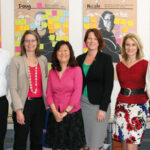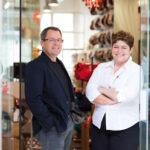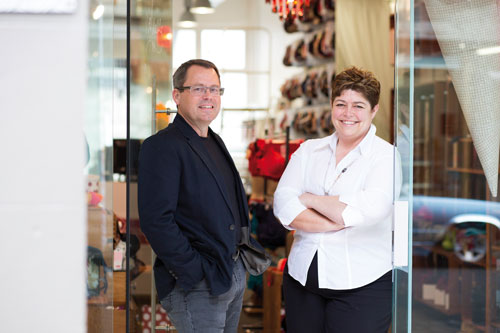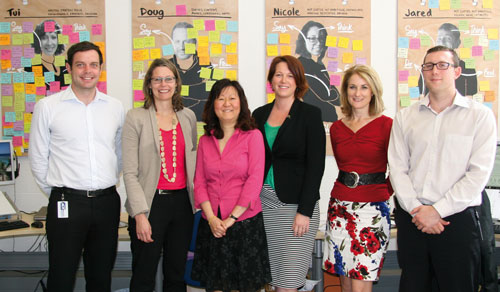Taking business to heart
Heart Saver NZ is a community-centred business quickly gaining market share, thanks to the passion and skills of owners Mike and Helen Mander.
Heart Saver NZ is a community-centred business quickly gaining market share in a relatively new niche, thanks to the passion and skills of owners Mike and Helen Mander.
They may be first-time business owners, but when you hear Mike and Helen Mander’s story, there’s no doubting that Heart Saver NZ is a business they are intrinsically cut out for.
Even though the business – which sells, distributes and tests automated external defibrillators (AEDs) – has been running less than two years, it has made spectacular progress.
The business came about as a result of a number of factors. In December 2011 Mike had been made redundant from his senior sales position in the finance sector. The needs of their five year old son Scotty meant that one of them had to be a stay-at-home parent, so working from home seemed the best option. A nine to five job was simply out of the question for Mike and Helen (who is a qualified accountant), and setting up a business with Mike’s redundancy money seemed the way to go. They gave themselves a three-month window to plan everything, but, in terms of income, there was no ‘plan B’ if the business didn’t work out. Friends told them they were crazy to start a new venture in the middle of a recession.
Heart Saver was the logical way to combine their prior work experiences and resources. Mike has been a volunteer firefighter for almost 20 years. He’s currently a station officer at West Harbour Volunteer Fire Brigade and holds a Queens Service Medal for long service and good conduct. Even today, when the siren sounds in Kumeu, if Mike’s in Heart Saver’s office, he’ll more often than not race across the road and end up on the fire truck. He’s up for a Gold Star in five years, but Mike’s not sure how long he can delay going full-time in the business.
It was his experience over the years assisting on medical response calls, and seeing the impact of sudden cardiac arrest on families, that made Mike realise how vital AEDs are. He firmly believes they can save lives, and in some instances, save lives where CPR alone can’t.
Frustrated at the lack of availability and high price of AEDs, the couple decided Heart Saver would be the perfect vehicle to combine Mike’s sales expertise and his first-hand working knowledge of AEDs. His background would also provide spades of credibility to the business.
Set up in their spare room in April 2012, the business has been profitable from day one. They hit the ground running; growing quickly with the help of telesales consultants in Auckland and Christchurch, and moving into their Kumeu office in May 2013.
Mike says the biggest challenge from the outset has been the lack of public awareness of AEDs. “The New Zealand Resuscitation Council had only recently included defibrillation as part of basic life support, so it’s been a hard sell into some companies.” Apart from cold calling, he says awareness largely comes about when employees attend first aid refreshers and learn about the need for the devices.
Mike admits it was initially soul destroying handling the ‘no’s’ – many health and safety people couldn’t see the need to have an AED available unless it was a legal requirement.
With New Zealand lagging behind Australia in AED uptake, Mike decided to target Australian-owned companies here, with some success. “Also, at the time there was media coverage of a number of high profile people, such as rugby player Hoani MacDonald, who had died or nearly died of cardiac arrest. That also highlighted the need to have AEDs on hand.”
There was also ignorance surrounding the operation of AEDs – many people don’t realise they’re automated and can be used with minimal training.
“When we started there was very little information here on the use and marketing of AEDs,” recalls Mike. “So we looked to the US and Europe to work out how to sell them in New Zealand.”
To get over resistance to the $3,000 price tag, particularly by organisations doing it tough, they offered a rental service, which proved popular.
Today, Mike says a ‘social conscience’ is prompting companies of all sizes to invest in AEDs. Awareness is growing, the market has lifted considerably and today AEDs can be found everywhere – from large organisations to private homes and anywhere people gather in significant numbers. Thankfully the Kiwi ‘she’ll be right’ or ‘if there’s a problem we’ll call an ambulance’ attitudes no longer prevail. Mike’s heard some great excuses in the past.
Unlike their major competitors, like St John and Red Cross, Heart Saver’s business model is built exclusively around AEDs. However, the couple quickly realised that a comprehensive annual on-site testing regime was essential not only to smooth cashflow and add value to their service, but to ensure that the performance level of AEDs is not compromised and peoples’ lives put at risk. As with fire extinguishers, an AED is useless if it’s shut away in a cupboard and non-operational. By introducing their Health Check service Heart Saver’s potential customer base now includes any organisation or individual who owns an AED that requires testing and post-sale service. In fact, Heart Saver’s whole approach is a consultative one – supplying, installing and servicing devices and often not charging companies for teaching staff how to use them.
Mike and Helen are also well advanced in their plans to introduce training programmes in 2014. They’re leaving no stone unturned in the quest to build their business quickly – no doubt a key reason why they won the Most Outstanding Fledgling Business category in The David Awards 2013 and were runner up in the Best Emerging Business category at the Westpac Auckland West Business Excellence Awards.
Defining moment
Launching the business had its frustrations, particularly watching Mike’s redundancy money getting chewed up for very little result. “We initially purchased three AEDs to sell, and two months down the track they were still sitting there,” he recalls.
They contemplated ‘pulling the pin’ on the business many times, but the defining moment came when Mike made their first sale to Ernst & Young. He was so shocked that for a while he didn’t know what to do next. “I’ll raise an invoice,” Helen suggested, over the phone.
That invoice is now framed on the office wall. Since then there have been some major wins, involving some of New Zealand’s largest companies.
Awareness of AEDs is steadily rising, Mike & Helen know it’s only a matter of time before one of their devices is directly credited with saving a life. “We hope people never have to use one of course,” says Helen. “But its worth having an AED on standby just for peace of mind.” She points out that 80 percent of cardiac arrests happen in the home.
It’s been a full-on experience building the business they admit, but they’re now able to catch their breath – there’s a holiday planned, and time to think more strategically about the business. This is where Mike’s time with GE Finance has proved invaluable. It taught him to think forward; identify roadblocks to growth early and plan how to overcome them. That’s what they’ve achieved with Heart Saver.
Nowadays these two devout ‘Dragon’s Den’ fans admit they’d be open to somebody else coming on board to help grow the business further; they’ll soon be looking for a business development manager. But it will have to be the right person.
Meantime they’re passionate about pursuing their philosophy of improving awareness of AEDs, and how to use them. As part of that, and in line with their community focus, they are donating two AEDs per year to non-profits.
Hard work
Helen admits that before embarking on their business journey she often thought people who ran their own businesses were lucky. “We don’t call it luck anymore, because now we know just how much hard work is involved in building a business.” She says the business has given then a new understanding of what it takes to achieve real success. Any previous thoughts of envy towards other successful entrepreneurs have turned to admiration.
As for meeting expectations – as they informed the Awards judges during a visit earlier this year, their two year business plan was nailed after just six months, which put the heat on them to plan further in advance. “2014 will be the year we really go for it,” says Helen.
Diversity is the key to growth they believe, so they’ll be expanding their offering to include training, participation in events, first aid kits, more testing opportunities, and growth through acquisition. The day NZBusiness visited they were also pressing the ‘go live’ button on their new website; this one has built-in e-commerce functionality. They’ve also partnered with a number of large organisations, such as the Motor Caravan Association and Federation of Commercial Fisherman in order to access targeted markets.
Research conducted by Professor Harvey White, cardiologist and advocate for AEDs, suggests there is still a long way to go to market saturation (around 11,500 units). Helen and Mike see a busy five years ahead, and by expanding the team, more time to work on the business, and hopefully less time with Mike out of town on sales trips. “In terms of widespread AED take-up it’s not a matter of if it’s going to happen, but when,” believes Mike.
So what do they put their success down to so far? “Our skills, knowledge, ability to get in front of people and sell, and applying overseas experiences in a New Zealand context,” says Mike.
Helen is more specific, attributing their success to her husband’s sales abilities. “I may be biased, but to grow the business, we need to clone you,” she tells Mike. “And I don’t think we can afford another you, even if we could find one.”
Spoken from the heart – nice one Helen!
Glenn Baker is editor of NZBusiness.




